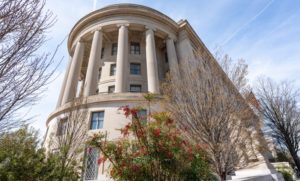
The Colorado Supreme Court disqualifies former President Trump from the state’s primary ballot, the FTC and Justice Department issue new Merger Guidelines, and more…
IN THE NEWS
- The Colorado Supreme Court disqualified former President Donald J. Trump from appearing on the Colorado Republican presidential primary ballot in 2024. The court ruled that President Trump is ineligible to hold the presidential office again under Section Three of the Fourteenth Amendment of the U.S. Constitution. Ultimately, the court judged that President Trump qualified as an officer of the United States during his tenure in office, and that his personal actions surrounding January 6, 2021 constituted engagement in an insurrection.
- The Federal Trade Commission (FTC) and the U.S. Department of Justice issued finalized 2023 Merger Guidelines, which outline the tools and standards the agencies will use when reviewing acquisitions and mergers to assess the risk that those consolidations will harm competition. White House economist Lael Brainard stated that the new guidelines are “an important step to lower costs for consumers, ensure a level playing field for small businesses, and ensure antitrust enforcement is fit for purpose in today’s economy.” The final Merger Guidelines, while not binding, strive to “provide transparency into the agencies’ decision-making process,” according to the FTC.
- The FTC proposed changes that would strengthen the Children’s Online Privacy Protection Act of 1998, which restricts how children’s online activity may be tracked by social media apps, video game platforms, and digital advertising networks. In addition to strengthening data security, the proposal would limit push notifications and targeted advertising and restrict the commercial use of children’s information by education technology firms. FTC Chair Lina M. Khan stated that “Kids must be able to play and learn online without being endlessly tracked by companies looking to hoard and monetize their personal data.”
- The U.S. Department of Energy proposed a new rule that would establish efficiency standards for a subset of electric motors known as “expanded scope electric motors.” Under the Energy Policy and Conservation Act, all new and amended efficiency standards must be designed to maximize energy efficiency while remaining economically justified and technologically feasible. The Energy Department noted that increasing the efficiency of equipment in general increases the purchase price and decreases annual operating costs. These operating costs include annual energy use, repair and maintenance costs, and energy price trends and prices.
- The U.S. Government Accountability Office (GAO) published a report outlining how the U.S. Congress could enhance oversight of the executive branch rulemaking process. First, the GAO proposed that Congress create a new congressional entity for regulatory oversight that would review the impacts of proposed and existing rules. The GAO also noted that Congress could reform regulatory oversight by setting new requirements for how agencies conduct cost-benefit analysis.
- A federal judge ruled that a California law that would have banned carrying firearms in most public places violates the Second Amendment. The law would have prohibited people from carrying concealed guns in 26 places—including public parks, playgrounds, churches, and banks—regardless of whether the person has a permit to carry concealed weapons. In blocking the law, the judge stated that it was “sweeping, repugnant to the Second Amendment, and openly defiant of the Supreme Court.”
- The California State Water Resources Control Board approved a regulation that permits the release of purified wastewater into the public water system. The regulation allows local water agencies to turn wastewater into drinking water through a process called “direct potable reuse.” The Board explained that the regulation aims to “make California more resilient to hotter, drier conditions.” California is the second state to approve of wastewater recycling after Colorado, which adopted direct potable reuse in January 2023.
- The U.S. Department of Agriculture (USDA) proposed a new rule that would amend existing forest land management plans to protect and restore old-growth forests. USDA explained that old-growth forests store carbon, increase biodiversity, reduce wildfire risks, and provide recreational opportunities. The proposal aims to integrate Indigenous knowledge into forest management through consultation with tribal nations and Alaska Native Corporations. Agriculture Secretary Tom Vilsack stated that old-growth forests “are a vital part of our ecosystems and a special cultural resource.”
- The U.S. Department of Veterans Affairs proposed a rule to reform its internal process for determining and allocating reasonable fees for claim benefit representation. Under current regulations, the Department’s Office of the General Counsel performs “fee reasonableness” review in two instances: when the claimant or the Department questions the reasonableness of the fee arrangement, or when multiple agents or attorneys provide representation. In recent years, reasonableness reviews have increased in frequency, prompting the Department to draft revised default fee allocations to reduce the number of reviews and streamline attorney and claimant compensation.
WHAT WE’RE READING THIS WEEK
- In a forthcoming article in the West Virginia Law Review, Nino Monea, a professor at the United States Military Academy, explored the veterans’ benefits system and how certain aspects of the system undermine its non-adversarial purpose. Monea explained that claimants suffer from a deluge of system bugs, from veteran law judge staffing shortages to policies that bar attorneys from participating until midway through the claims process. Monea concluded that an abundance of procedural barriers and institutional disadvantages compromise what is intended to be a non-adversarial, paternalistic system.
- In an article in the Harvard Environmental Law Review, Robert W. Adler, a professor at the University of Utah S.J. Quinney College of Law, and Carina E. Wells, then a law student at the University of Utah S.J. Quinney College of Law, underscored the severity of the plastic pollution crisis and identified limits in domestic environmental law. Adler and Wells outlined how the complexity and granular nature of environmental regulation in the United States prevents enforcement agencies from regulating a shifting plastics production ecosystem effectively. Adler and Wells concluded that regulatory reform is essential to solving the plastic crisis.
- In an article in the New York University Journal of Law and Business, Hilary J. Allen, a professor at the American University Washington College of Law, argued that the failure of agencies to regulate emerging technologies harms the public interest. Allen explained that agencies hesitate to regulate technological development out of fear that the regulations may fail. Allen has previously contended that such fear undermines the goals of the regulatory state and prevents agencies from fulfilling their statutory mandates. In this article, Allen maintains that trial and error is a “hallmark of the innovation process” and that regulators must be given permission to fail.
EDITOR’S CHOICE
- In an essay in The Regulatory Review, Richard J. Pierce, Jr. a professor at the George Washington University Law School, argued that judicial review that requires governmental entities to justify their actions protects against bad faith decision-making and limits the impact of political polarization. Pierce explained that in 1983, the Supreme Court’s MVMA v. State Farm decision established that courts must review governmental actions to ensure agencies engage in reasoned decision-making. Pierce claimed that since the State Farm decision, “the Court has done an excellent job of identifying, strengthening, and broadening the scope” of judicial review.



